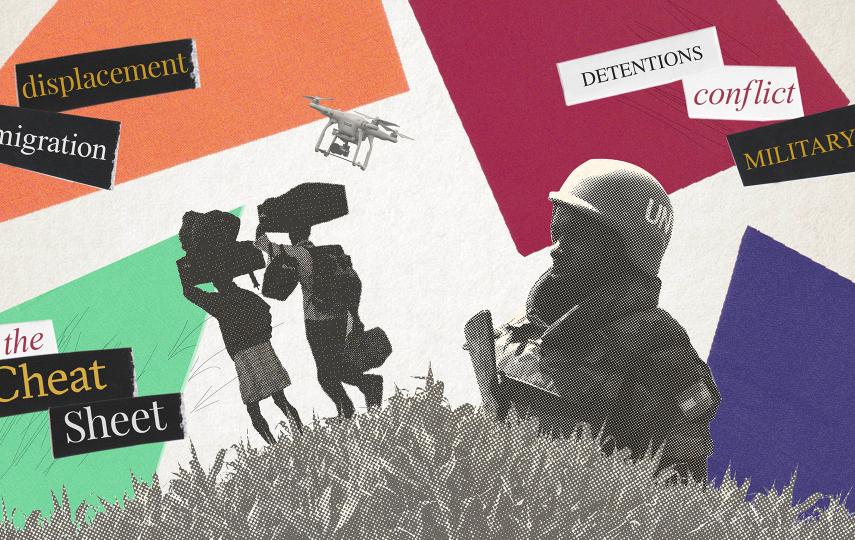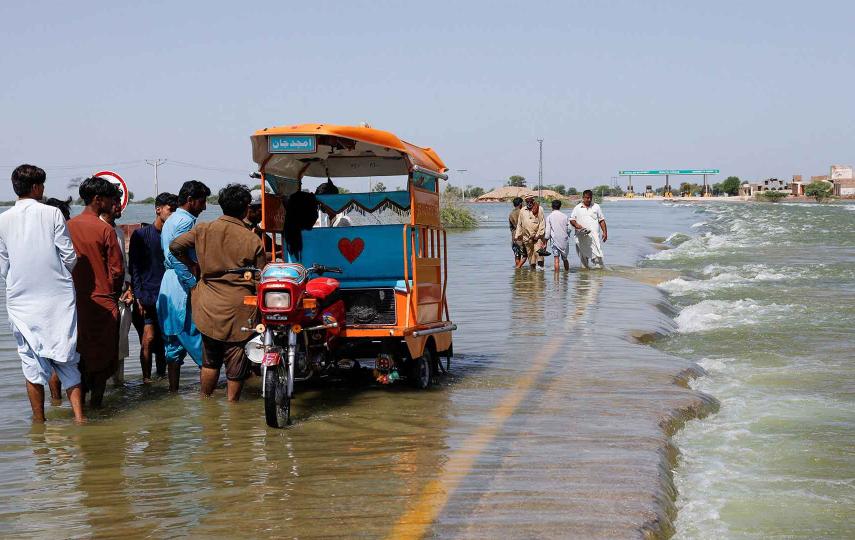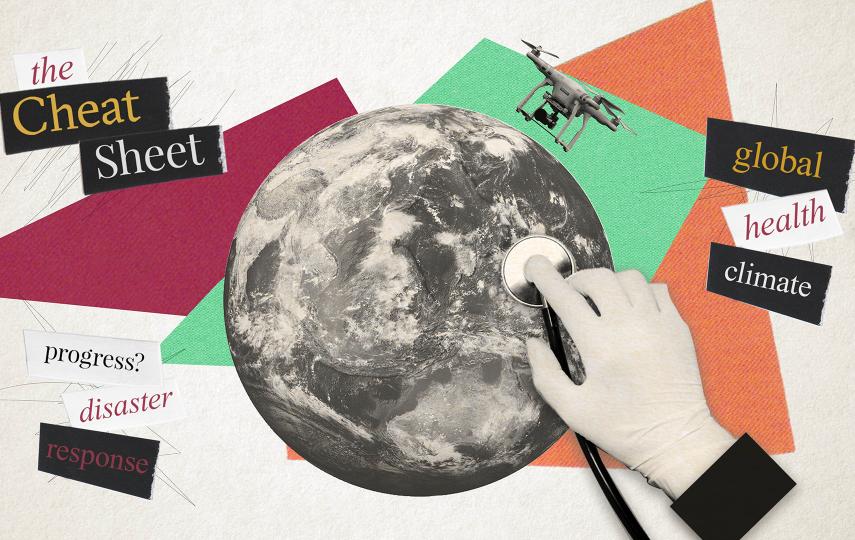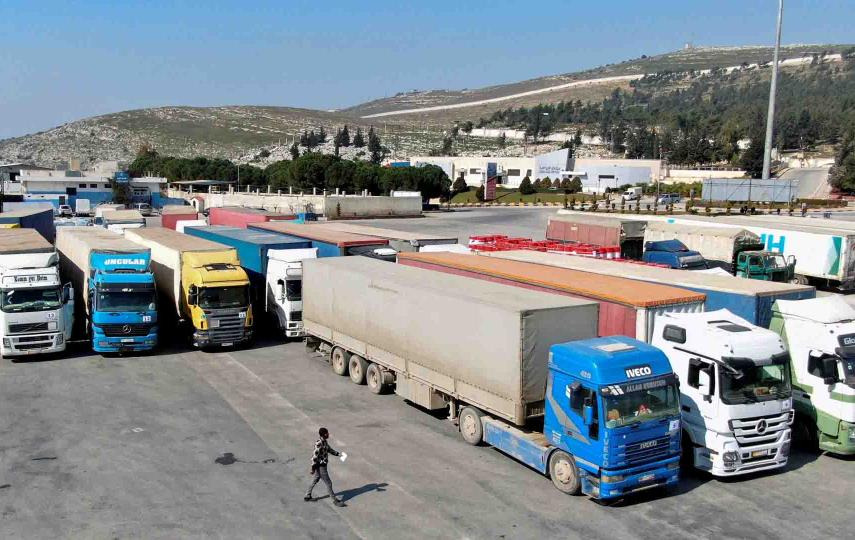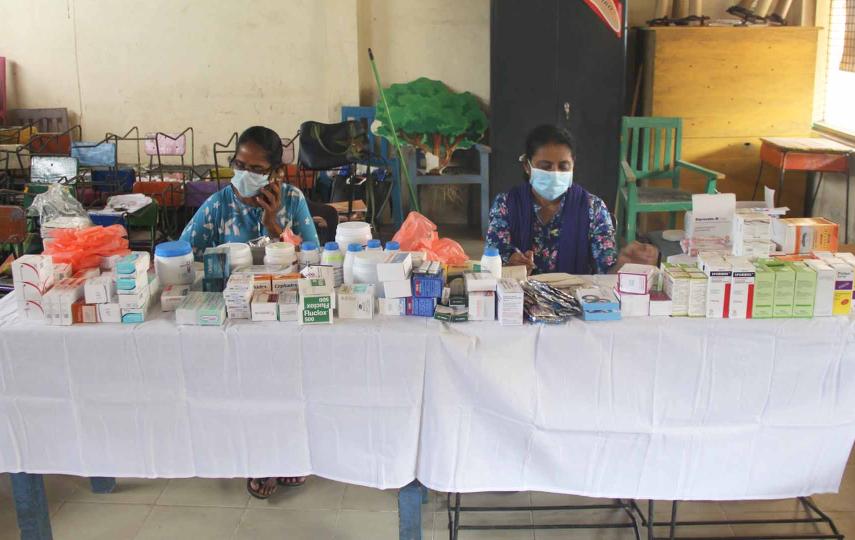Our editors’ weekly take on humanitarian news, trends, and developments from around the globe.
On our radar
Money problems
Due to a shrinking economy, the UK may cut up to $3.6 billion (about 18 percent) from its international aid budget this year. But that's just the start: Rich country aid could fall by $19 billion (from $153 billion in 2019), according to a “worst-case” scenario published by analysts Development Initiatives (DI). Its survey of humanitarian funding (a subset of overall aid spending) showed a decline in 2019 – the first since 2012. The Global Humanitarian Assistance Report 2020 also found that even less than usual reached the governments and NGOs of affected countries, and that more donor funding is earmarked for specific purposes. Reduced tax revenue and private remittances due to COVID-19 will have more impact on the economies of countries in crisis than aid flows, however. DI reported that use of cash allowances as aid to affected people increased in 2019, now standing at $5.9 billion of a total of $29.6 billion in 2019. More on that in the annual report of the humanitarian cash group CaLP, also out this week.
Indigenous concerns grow
Four months after COVID-19 was first suspected of spreading to Indigenous communities in the Amazon Basin, the head of the World Health Organization, Tedros Adhanom Ghereyesus, says the WHO is “deeply concerned” by the pandemic’s impact on native populations. He mentioned the recently contacted Nahua people in Peru, six of whom have caught the virus. Poverty, malnutrition, and the prevalence of communicable and non-communicable diseases put Indigenous people at greater risk from coronavirus, and throughout the Americas over 70,000 cases have been confirmed and 2,000 people have died among their communities, including several leaders. The Organization of American States (OAS) has asked Brazil to specifically protect the Yanomami and Yekuana peoples, who may have been infected by workers from the government’s Indigenous health service, SESAI, according to a New York Times report. The plight of the Indigenous Amazonian peoples has been gaining the attention of environmental campaigners, more used to defending the region against deforestation. Climate change activist Greta Thunberg is donating part of her one-million-euro Prize for Humanity to a group that assists communities in fighting the virus.
Aid workers killed in Nigeria
Islamic State in West Africa (ISWAP), the Nigerian jihadist group, has executed five civilians abducted last month. They included four aid workers from Action Against Hunger, International Rescue Committee, Reach International, the Borno State Emergency Management Agency, and a security guard – all kidnapped on the road from the northern town of Monguno to Maiduguri, the state capital. The group had reportedly demanded a $500,000 ransom. In January, ISWAP freed three aid workers and a civilian they had abducted the previous month. “Ransom payments have become part of the conflict economy, [but in this case] the negotiations failed,” a security analyst told The New Humanitarian. In 2019, ISWAP executed 12 aid workers while two others remain in captivity. There has been a series of leadership changes within ISWAP. Its new incarnation is taking a harder line, targeting civilians it accuses of siding with the army – an approach it had previously avoided. The new wali, or governor, is believed to be a man known as Ba Lawan – one of the early jihadist pioneers. Section commanders also seem to have greater autonomy in keeping with the more fluid leadership, the security analyst told TNH.
Polio vaccinations restart
Polio vaccination plans are cautiously resuming in parts of the globe, months after door-to-door campaigns were suspended due to the pandemic. Pakistan this week began small-scale responses aimed at vaccinating 800,000 children in several districts. Afghanistan has also begun a campaign to reach 1.1 million children. Both countries are among only three – Nigeria being the other – where polio transmission has never stopped. The Philippines also announced plans to resume vaccinations in Mindanao, while Burkina Faso completed a four-day campaign in early July. Fearing mass vaccination drives might inadvertently spread the coronavirus, the board of the Global Polio Eradication Initiative (GPEI) advised countries in April to postpone campaigns, acknowledging that “more children may be paralysed by polio as a result”. The board urged regular immunisations to continue, but in practice, coronavirus lockdowns and infection fears have disrupted vaccinations in many countries. The impacts of weeks of missed vaccinations aren’t yet clear. The WHO estimates 60 million children missed out on polio vaccines in 22 countries spanning parts of North Africa, the Middle East, and Asia. GPEI stats show polio cases this year have more than doubled compared to the same period last year. The global eradication drive was struggling even before the coronavirus, marred by poor access in conflict zones, inadequate responses in some countries, and a surge in new, border-crossing polio outbreaks.
Running aground in Italy
On 22 July, Italian authorities detained another NGO operated search and rescue vessel – the fourth to have fallen foul of “technical irregularities” since the beginning of the pandemic. The move fits a pattern of authorities using administrative procedures to block the work of search and rescue NGOs in the central Meditterannean, according to human rights groups. At the end of June, the Ocean Viking rescued 180 asylum seekers and migrants who had departed from Libya. Authorities in Italy and Malta refused to assign the ship a safe harbour for eight days, leading to a severe deterioration in the mental health conditions of those on board. After the rescued people disembarked in Sicily, the Ocean Viking observed a 14-day quarantine before it was inspected and impounded. Meanwhile, an Italian public prosecutor announced this week that the captain of an Italian merchant vessel will face trial – the first of its kind in Italy – for returning 101 asylum seekers and migrants to Libya in 2018.
COVID-19 news
LEBANON: A group of aid agencies and NGOs have warned that more and more families are at risk of eviction as the country’s economic crisis continues – worsened by COVID-19. Widespread job losses have made it hard for already vulnerable populations, especially Syrian refugees, to pay rent, including those living in collective shelters.
MADAGASCAR: As coronavirus cases spike, overwhelmed hospitals have warned they will only accept patients with the most severe COVID-19 symptoms. The government has re-imposed a lockdown on the central region it had eased in April. The president controversially touted an untested herbal cure, and recorded cases have risen to roughly 8,400, with 70 deaths.
THE PHILIPPINES: Local organisations in Cebu City say resources are running low after weeks of ongoing lockdowns in one of the country’s largest cities. Hard lockdowns continue even as restrictions ease elsewhere in the Philippines. This week, eight Cebu-based groups called for help from international NGOs and humanitarian donors so that local efforts to provide food, nutrition, and healthcare support could continue. A poll carried out by the groups found that nearly half of the families surveyed were skipping meals to cope with lost income.
UNITED STATES: The suspension of asylum hearings for around 18,000 people waiting in northern Mexico under a controversial US policy has been indefinitely extended. Hearings were supposed to re-start on 20 July. Meanwhile, Canada’s Federal Court ruled that the United States is no longer a safe third-country for asylum seekers, in a strong rebuke of US policies that have eroded access to asylum and protections for asylum seekers.
YEMEN: With record-keeping uneven, non-existent, or suppressed, nobody knows exactly how many people have really died of COVID-19 in Yemen. A report out this week from MedGlobal looks at the impact of the pandemic on the country and its healthcare workers, arguing that, “when one medical professional dies, the effect is exponential and extends to their entire community”. The medical NGO has documented 97 reported deaths of doctors, nurses, dentists, and others in the healthcare field. If you haven’t read it yet, now’s a good time to read this diary by Dr Ammar Derwish, who has been keeping track of the outbreak in his home city of Aden.
In case you missed it
ASIA RAINS: ‘Excessive’ monsoon rainfall is driving severe flooding over large swathes of Asia, from northeast India and Bangladesh, to China, Mongolia, and Japan. Floods have hit some 10 million people in South Asia, destroying crops and farmland, forcing evacuations, and killing at least 550 people. Heavy rains and floods have forced some 2.7 million people in China to evacuate, and threatened food security in parts of Mongolia.
MALI: West African presidents arrived in Mali on Thursday in the latest attempt to mediate a political crisis that has reached boiling point in the country. Protesters have been calling for the resignation of President Ibrahim Boubacar Keita, who has struggled to stem rising jihadist and inter-communal violence in the country after seven years in power. Read more from the ground.
SUDAN: Former president Omar al-Bashir arrived at court in Khartoum on Tuesday to face charges relating to the 1989 coup that brought him to power. The 76-year-old – who could face the death penalty if found gulity – was ousted last year after months of protests. A transitional government is now in place, but the road to democracy remains full of obstacles.
SYRIA: The Mayday Rescue foundation that handled millions in donor grants to the White Helmets rescue group will be closed after an investigation found examples of financial mismanagement, including irregular payments to one of its founders. British former army officer James Le Mesurier informed donors of the findings shortly before his death by a fall from a balcony in Istanbul, according to Dutch newspaper de Volkskrant.
UK: A trustee of UK NGO Islamic Relief Worldwide, Heshmat Khalifa, has resigned after anti-Semitic Facebook postings and praise for the armed wing of Palestinian group Hamas in 2014 and 2015 were exposed by the Times newspaper. In a statement, Islamic Relief said: “We are appalled by the hateful comments he made and unreservedly condemn all forms of discrimination, including anti-Semitism.”
Weekend read
Coronavirus vaccine trials in South Africa no ‘magic bullet’ as cases soar
Vaccines take time to test, to be mass produced, and to be delivered. But they also take time to become effective on a wide scale. The first COVID-19 vaccine may be ready for use early in 2021, but experts note it could take three to five years for vaccinations to really prevent the spread of the infection caused by the coronavirus. The road ahead is long, but final “Phase 3” human trials of the promising ‘Oxford vaccine’ are already taking place, including in South Africa. And some are hailing the country’s participation at this stage in the pandemic as a “landmark moment” to help counter “vaccine nationalism” and stop wealthy countries or groups from gaining privileged access to the new drugs – as recently witnessed in the H1N1 pandemic. In this week’s weekend read, learn how the trial is being rolled out, and why South African researchers say it’s important to continue managing expectations.
And finally…
34.5 years and counting
Ugandan President Yoweri Museveni is a trim, fighting fit 75-year-old. He’s released a video of his daily workout routine to prove it: 30 press-ups, and endless laps of his sumptuously carpeted office. You also suspect he’d have little problem memorising “person, woman, man… camera, TV”. And, like 74-year-old US President Donald Trump, an equally controversial Museveni is seeking re-election. But whereas Americans have only had four years of Trump, should Museveni triumph in February 2021, he’ll have been in power for four decades. Museveni has a knack for winning: The opposition says that’s because of rigging and the violence of the police. This time, Museveni is also accused of using COVID-19 to ban public campaigning. The airwaves aren’t really an alternative: state-owned media has a history of bias; several private broadcasters are owned by ruling party figures; and a raft of laws has been used to crack down on digital activism. Museveni is believed to have a succession plan involving his son, General Muhoozi Kainerugaba, and/or his powerful wife, Janet. But first he needs to defeat youthful MP and opposition icon, Robert Sentamu Kyagulanyi – a.k.a. Bobi Wine – who insists Museveni’s time is up.
Just like I had earlier promised, I started my day with indoor exercising. pic.twitter.com/vsTT9Ho6To
— Yoweri K Museveni (@KagutaMuseveni) April 9, 2020
kp-bp-oa-pk-il-as-pdd-er/ag
